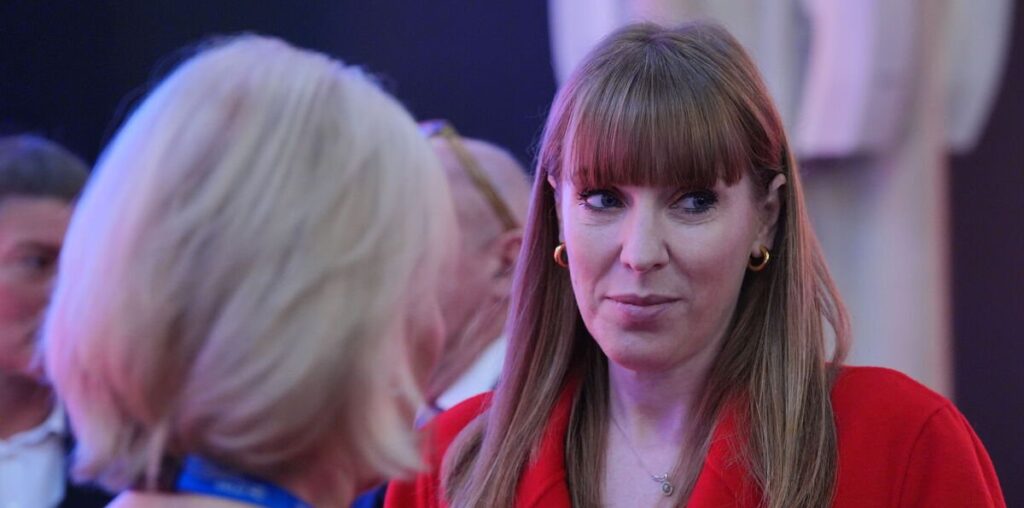Angela Rayner is among Labour Cabinet ministers opposing Rachel Reeves’s mooted “miserable” cuts to Government spending, it emerged last night.
Rumours are swirling in Westminster that the Chancellor is poised to launch the biggest Budget tax raid in history.
Whitehall sources suggested much of the £40bn Ms Reeves is hoping to find would come through tax rises.
But planned cuts to Government departmental spending have provoked fury from senior members of Sir Keir Starmer’s Government.
Several senior ministers, including Deputy Prime Minister Ms Rayner and Justice Secretary Shabana Mahmood are understood to be concerned over Treasury proposals to cut departmental spending plans by as much as 20 per cent next year.
One government official told the Financial Times: “Ministers and departments feel that what they are being given is very miserable. They are worried about what it means for government ambitions and commitments.
“But of course they can’t see the overall picture — quite how difficult the inheritance really is and the scale of the pressures on tax and borrowing. But it’s very, very difficult for all of them.”
A source in one government department said: “We are still in the middle of negotiations. It’s not surprising that it’s going to be a challenging spending review.”
Another source said: “We face the problem of paying for the spending pressure that we have inherited (the £22 billion), paying for the spending pressure on departments, and paying for manifesto commitments.
“If you’re trying to avoid implied spending cuts, you can’t do that by making spending cuts. That leaves tax rises.
“We are all trying to work together to make the choices as less challenging as possible.”
Some budgets, such as the NHS and the Ministry of Defence have “protected” budgets, with Ms Reeves also expected to increase spending.
But this means unprotected departments, such as the Home Office, Ministry of Justice and Department for Transport, as well as areas such as local government and housing, could be cut.
A senior Treasury source said that ministers had not understood the scale of the challenge facing Reeves. “They’re using a classic trade union negotiating tactic,” the source said. “But we don’t have any spare cash lying around to give them. This is only phase one of the spending review — as soon as the budget is over, we’re going to have to do this all over again.”
The Chancellor is planning tax hikes to cover a shortfall in the public finances nearly double the amount she first claimed was needed.
Experts said Rishi Sunak’s election warning that Labour would mean a £2,000 tax bombshell was “looking pretty bang on”.
Tories said accusations about the gap in the finances is a “poor attempt” to justify brutal measures Labour had been planning all along.
Shadow Treasury minister John Glen said: “This supposed blackhole is fundamentally a product of Labour’s own decisions, decisions they are refusing to take ownership for.
“During the election, we publicly called out Labour’s planned profligacy.
“We warned that many unfunded spending commitments would run into the tens of billions of pounds.
“We made clear that it would be the public that would have to pay the price for this.
So once again we are seeing Labour talk up a blackhole but like all of their claims that have come before, it is bogus.
“The public should not swallow any of this latest nonsense, and see it instead for what it truly is – another poor attempt to justify the budget they have been planning all along that will be deeply damaging for growth, for investment, for our economy and for the public’s purses.”
Three weeks after the election, Ms Reeves announced she had found a £22bn shortfall and said she was axing the winter fuel allowance to save £1.4 billion.
Labour had failed to commit to keeping the payment in its election manifesto despite doing so in previous elections.
The Chancellor told ministers in a Cabinet meeting on Tuesday that the £22bn figure would only “keep public services standing still”.
Instead, £40bn is now said to be needed to plug to protect key departments from real-terms cuts and put the economy on a firmer footing.
Former Treasury adviser Rupert Harrison said Mr Sunak’s election campaign claim that Labour would put up everyone’s taxes by £2,000 is “looking pretty bang on”.
He added. “The cynicism of Labour’s election campaign is quite something. Transparently obvious that the plan was always to put up taxes to pay for higher public spending, they just weren’t willing to campaign on it.”
Institute for Fiscal Studies chief Paul Johnson said that finding £40bn from tax hikes alone would be “extraordinary” and suggested the Government would eventually need to target income tax if it went down this route.
“If we get tax rises on that scale, that really will be extraordinary – I mean, unprecedented,” he said.
“Forty billion pounds is a big number, you can get there relatively easily actually in terms of the scale of additional spending that will be required down the line.
“Some of that can be covered by slight changes in the fiscal rules, some of that will be covered by some of the tax rises the party is already intending.”
But he added that a “significant” amount would still be left unaccounted for even after these measures.
“If they’re looking for £20 or £30 billion of tax rises, in the end, they will have no choice but to do something with income tax,” he said.
The government is looking at increasing employer contributions on national insurance – a move critics claim is a breach of Labour’s manifesto.

